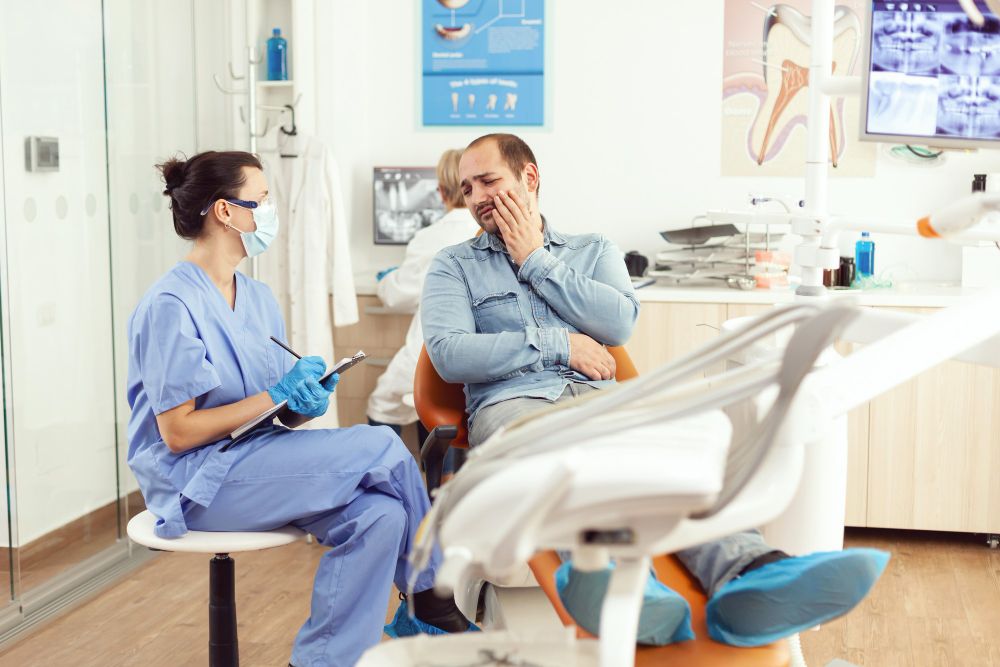Emergency dentistry addresses urgent dental problems that require immediate treatment to alleviate pain, prevent further damage, and save teeth. This guide provides an overview of emergency dentistry, including common dental emergencies, first aid measures, when to seek emergency care, emergency procedures, prevention strategies, and how to find an emergency dentist.
Definition of Emergency Dentistry
Emergency dentistry is a branch of dentistry that focuses on treating acute dental issues that require immediate intervention.
Importance of Emergency Dental Care
Timely emergency dental care can relieve pain, prevent infections from spreading, and save damaged or knocked-out teeth.
Common Dental Emergencies
Several dental problems require immediate attention to prevent complications.
Severe Toothache
Severe toothache can be caused by infection, decay, or trauma and may require immediate treatment to alleviate pain.
Knocked-Out Tooth
A knocked-out tooth should be treated as an emergency. Prompt replantation can save the tooth.
Cracked or Fractured Tooth
Cracked or fractured teeth can cause severe pain and sensitivity, requiring immediate evaluation and treatment.
Abscess
An abscess is a serious infection that can spread to other parts of the body if left untreated.
Lost Filling or Crown
A lost filling or crown can expose the underlying tooth structure to bacteria and sensitivity, requiring prompt replacement.
Soft Tissue Injuries
Soft tissue injuries, such as cuts or lacerations to the gums, tongue, or cheeks, may require immediate attention to control bleeding and prevent infection.
First Aid for Dental Emergencies
Knowing basic first aid measures can help manage dental emergencies until professional care is available.
Toothache Relief
Rinse the mouth with warm water, floss gently to remove food particles, and take over-the-counter pain relievers.
Saving a Knocked-Out Tooth
Rinse the tooth gently, try to reinsert it into the socket, and hold it in place. If this is not possible, store the tooth in milk or saline solution and seek immediate dental care.
Managing a Cracked or Fractured Tooth
Rinse the mouth with warm water and apply a cold compress to the face. Seek immediate dental care to evaluate and treat the tooth.
Addressing an Abscess
Rinse the mouth with warm salt water and seek immediate dental care. An abscess requires prompt treatment to prevent the infection from spreading.
Dealing with a Lost Filling or Crown
If possible, try to reattach the filling or crown with dental cement or denture adhesive. Seek prompt dental care to have it properly replaced.
Caring for Soft Tissue Injuries
Rinse the mouth with warm water and apply pressure to the wound with a clean cloth. Seek immediate dental care if bleeding is severe or does not stop.
When to Seek Emergency Dental Care
Recognizing when a dental problem requires emergency care is crucial.
Signs of a Serious Problem
Signs of a serious dental problem include severe pain, swelling, bleeding, and difficulty breathing or swallowing.
Difficulty Breathing or Swallowing
Difficulty breathing or swallowing may indicate a serious infection that requires immediate medical attention.
Uncontrollable Bleeding
Uncontrollable bleeding from the mouth may require immediate medical intervention.
Severe Pain
Severe, unrelenting pain that cannot be managed with over-the-counter pain relievers may indicate a serious dental problem.
Emergency Dental Procedures
Emergency dental procedures are aimed at relieving pain, treating infections, and saving teeth.
Root Canal Therapy
Root canal therapy may be necessary to treat infected or severely damaged teeth.
Tooth Replantation
Tooth replantation is the process of reinserting a knocked-out tooth into its socket.
Extraction
Extraction may be necessary for teeth that are severely damaged or infected and cannot be saved.
Incision and Drainage
Incision and drainage is performed to relieve pressure and drain pus from an abscess.
Repairing Fractures and Restorations
Fractured teeth and lost restorations may need to be repaired or replaced to restore function and prevent further damage.
Preventing Dental Emergencies
Taking preventive measures can help reduce the risk of dental emergencies.
Regular Dental Check-ups
Regular dental check-ups allow the dentist to detect and treat problems early, preventing them from becoming emergencies.
Practicing Good Oral Hygiene
Good oral hygiene, including brushing, flossing, and using mouthwash, helps prevent tooth decay and gum disease, which can lead to emergencies.
Wearing a Mouthguard
Wearing a mouthguard during sports and other activities can help protect the teeth from injury.
Avoiding Hard or Sticky Foods
Avoiding hard or sticky foods can help prevent cracked or fractured teeth and dislodged fillings or crowns.
Finding an Emergency Dentist
Knowing how to find an emergency dentist is essential in case of a dental emergency.
Local Dental Clinics
Many local dental clinics offer emergency dental services.
Hospital Emergency Rooms
Hospital emergency rooms can provide treatment for severe dental emergencies, such as trauma or infection.
Online Directories
Online directories can help you find an emergency dentist in your area.
The Role of Teledentistry in Emergencies
Teledentistry can play a valuable role in managing dental emergencies.
Remote Consultations
Remote consultations can help assess the severity of the problem and provide advice on first aid measures.
Triage and Advice
Teledentistry can be used to triage dental emergencies and provide advice on whether immediate care is needed.
Conclusion
Emergency dentistry provides essential services for addressing urgent dental problems. By knowing how to handle common emergencies, when to seek professional care, and how to prevent emergencies, you can protect your oral health and well-being.
FAQs Section
What is a dental emergency?
A dental emergency is a dental problem that requires immediate treatment to relieve pain, prevent further damage, or save a tooth.
What should I do if I knock out a tooth?
Rinse the tooth gently, try to reinsert it into the socket, and hold it in place. If this is not possible, store the tooth in milk or saline solution and seek immediate dental care.
How can I prevent dental emergencies?
You can prevent dental emergencies by practicing good oral hygiene, wearing a mouthguard during sports, and avoiding hard or sticky foods.
Where can I find an emergency dentist?
You can find an emergency dentist at local dental clinics, hospital emergency rooms, or through online directories.

